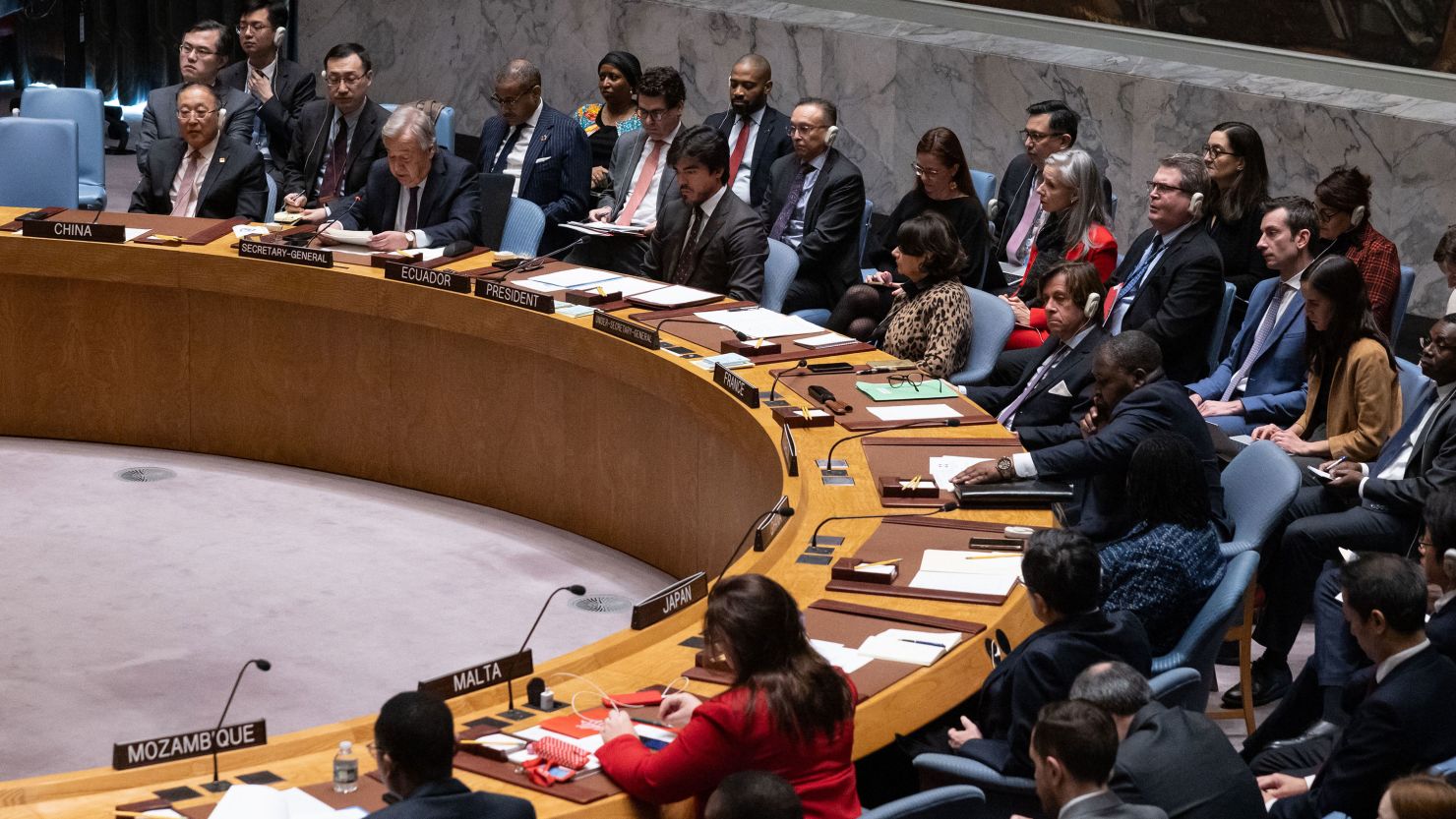
Originally written for Canadian Dimension.
Shortly after the news broke of the United Nations General Assembly’s December 13 vote to demand an “immediate humanitarian ceasefire” in Gaza, I bumped into a neighbour who has been following events there. She is by no means a political activist or someone who normally takes a great interest in international affairs, but the horror of the Israeli assault on the Palestinian people has shocked and shaken her.
Upon seeing me, she expressed her joy at the news and I understood that she had mistakenly assumed that a vote by an overwhelming majority of countries on Earth would mean that a ceasefire would now take effect. She was surprised to learn that the General Assembly couldn’t take enforceable decisions, that this power lay with a tiny Security Council and that the United States had been able to use its veto within that body to perpetuate the genocide over the objections of 153 countries.
It struck me that my neighbour’s misunderstanding was actually quite reasonable and that any rational and fair-minded person would find the ability of the US to act in this way entirely indefensible. Yet, the UN members’ lack of decision-making power betrays a terrible reality. The notion of a legally governed international community is actually a polite fiction that masks the reality of the indirect empire of the United States.
US hegemony
The hegemonic power of the US enables it to play a dominant role in global affairs and the functioning of international bodies. This flows, of course, from Washington’s great economic and military strength. As Monthly Review noted nearly two decades ago, “The United States emerged from the Second World War with the most extensive system of military bases that the world had ever seen.” These remain “staging areas around the globe, as a means of deploying air and naval forces to be used on a moment’s notice—all in the interest of maintaining its political and economic hegemony.”
Though the US does directly control some territories as its possessions, and has a long and bloody history of invading countries it wishes to bring to heel, it generally enforces economic subservience without the overt colonialism of the past. Most of the countries the US dominates enjoy nominal independence and limited powers that rest in the hands of suitably compliant regimes whose leaders know what side their bread is buttered on.
The strategically and economically vital Middle East and North Africa (MENA) region is a particularly clear cut example of this method of maintaining US dominance. A series of repressive and collaborationist regimes hold the populations in check while the settler state of Israel, armed to the teeth by the US, functions as a much valued garrison of US interests. This accounts for the enormous lengths the Biden administration has gone to in order to enable the current assault on Gaza to proceed in spite of all international objections.
This indirect application of hegemonic power has shaped US relations with international bodies. It is the main funder of the UN and acts vigorously within the structures of that institution to obtain desired results. At the same time, it always stands ready to defy the will of the member countries. The yearly ritual in which the US ignores a vote against its blockade of Cuba is a particularly striking example of this.
In much the same way, as Zaara Zain Hussain has observed, “the United States has refused to be subject to jurisdiction of international legal bodies like the International Criminal Court (ICC) and refrained from embracing key human rights regimes with the United Nations, despite its support for the international rule of law.” This is because “the hegemon is not dependent on the international system and does not have to comply with all its rules. Unilateralism and multilateralism are both tools to achieving foreign policy objectives and a hegemon can chose either depending on which one will suit its benefits best at the moment.”
As it has shaped and directed the multilateral side of the equation, the US has also gone to great lengths to promote institutions that would be more malleable than those subject to UN control. In his recent study of the World Bank, Eric Toussaint shows how this body and the closely related IMF have functioned as global enforcers for US economic interests and as foreign policy instruments bent to serve specific US aims and objectives.
During the neoliberal decades, the need for compliant institutions to advance US interests has increased. Thus, the World Trade Organization (WTO) was formed in 1995, to advance the ‘reform’ of trading systems in ways that benefited the US and its Western allies at the expense of the Global South.
In his book Pharmanomics, Nick Dearden captures the role of the WTO very clearly when he suggests that “If capitalism was to expand into a truly global market… rules would need to be standardised. If that undercut the ability of some countries to develop their own technologies, and in turn their own economies, that was just too bad.”
For the US, maintaining its ability to play a dominant role within the multilateral structures while acting outside them when it so chooses is a complex and challenging operation. It involves threats, reprisals, rewards and tactical alliances, but it also demands that appearances be kept up and tensions contained. For the US hegemon, those tensions have reached dangerous levels over the ongoing genocide in Gaza.
World order
The ceasefire vote in the UN General Assembly may not be immediately enforceable but it is still a significant development that reflects major tensions within the US-led world order. It was the second such vote taken by that body and it was even more overwhelming than the one that took place in October. Moreover, the US is losing support even among its key Western allies. Canada didn’t only go over to support for the ceasefire but joined with Australia and New Zealand in issuing a statement declaring that “The price of defeating Hamas cannot be the continuous suffering of all Palestinian civilians.”
It is worth noting that the second vote took place under UN Resolution 377A (V), also titled “Uniting for Peace.” This measure was intended to be used if the Security Council, “because of lack of unanimity of the permanent members, fails to exercise its primary responsibility for the maintenance of international peace and security in any case where there appears to be a threat to the peace, breach of the peace, or act of aggression.”
When the UN secretary-general and those supporting him decided to use this extraordinary measure, they were orchestrating, not simply a second vote, but an effective censure of the role of the US in providing cover for Israel. A crisis has emerged within the United Nations that has serious implications for its functioning.
The problems facing the Biden administration are greatly compounded, not only by the indefensible brutality being unleashed by Israel, but by the lack of any clearly obtainable result from the operation in Gaza. As monstrous levels of death and suffering are inflicted, even very conservative commentators continue to point to the lack of “a political endgame… that could end the carnage in Gaza.”
With the humanitarian crisis spinning out of control, resistance from Hamas fighters continuing unabated, a major social mobilization in support of the Palestinians rallying huge crowds across the world, and near universal international condemnation of the genocide, Washington’s defence of the indefensible is on ever shakier ground.
The arrival of Biden in the White House was supposed to signal a restoration of responsible and credible US global leadership after the erratic Trump years. Now, Biden’s dogged support for Israel’s unrelenting attack on Gaza has given new wings to the image of the “Ugly American.” As the weeks drag on and Israel continues its campaign of collective punishment and ethnic cleansing, the whole world knows that it is entirely reliant on a steady flow of US military supplies, the threatening presence of US warships and Biden’s diplomatic cover.
US hegemony is by no means as robust as it used to be, threatened as it is by the rising power of China. Though the global empire can rely on an unrivalled military power and a great capacity for economic coercion, a functioning Washington Consensus requires a minimum level of acquiescence and stability and this is being threatened by the present situation.
Biden repeatedly declared that “if there were not an Israel, we’d have to invent one.” With this comment, he expresses the prevailing view of the US establishment that the garrison state in the Middle East functions as an indispensable enforcer of Washington’s brand of stability in the region. At this point, however, this strategic asset is becoming a source of great regional and international instability. This is a development with enormous implications that we can expect to play out dramatically in the days ahead.
